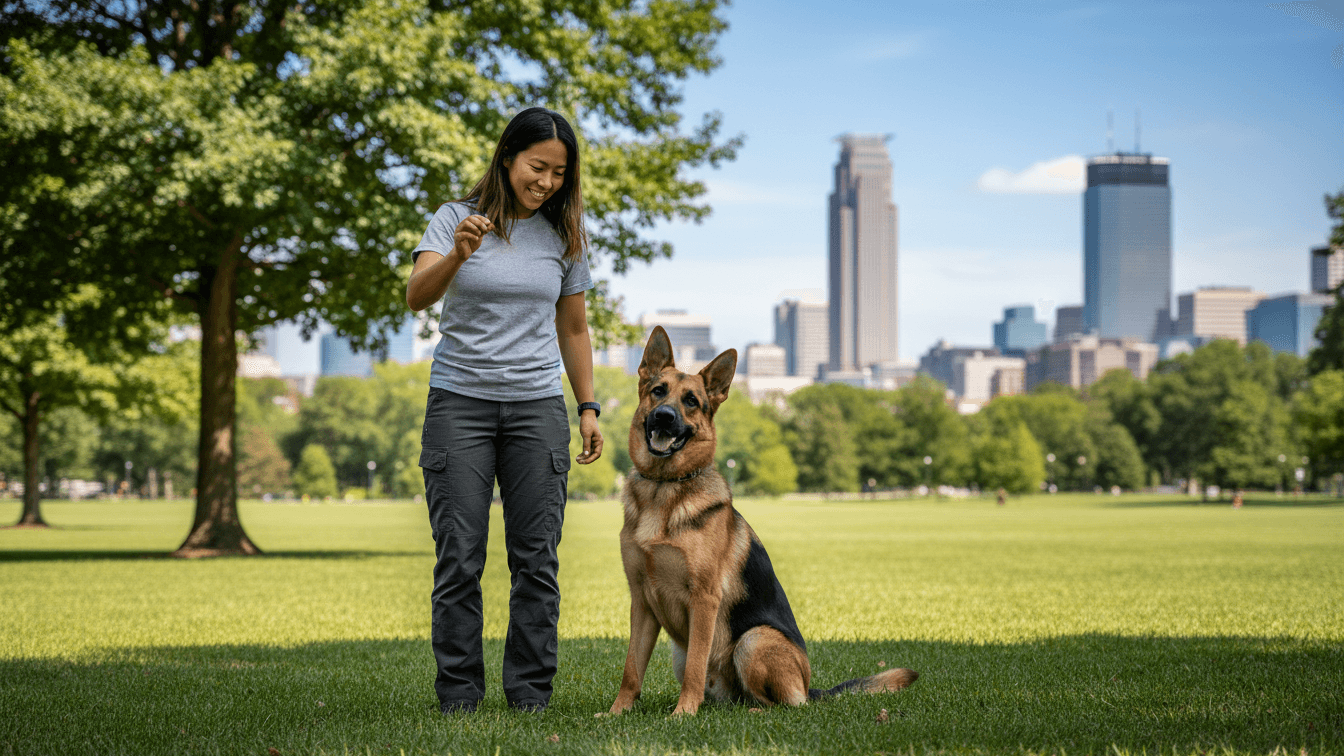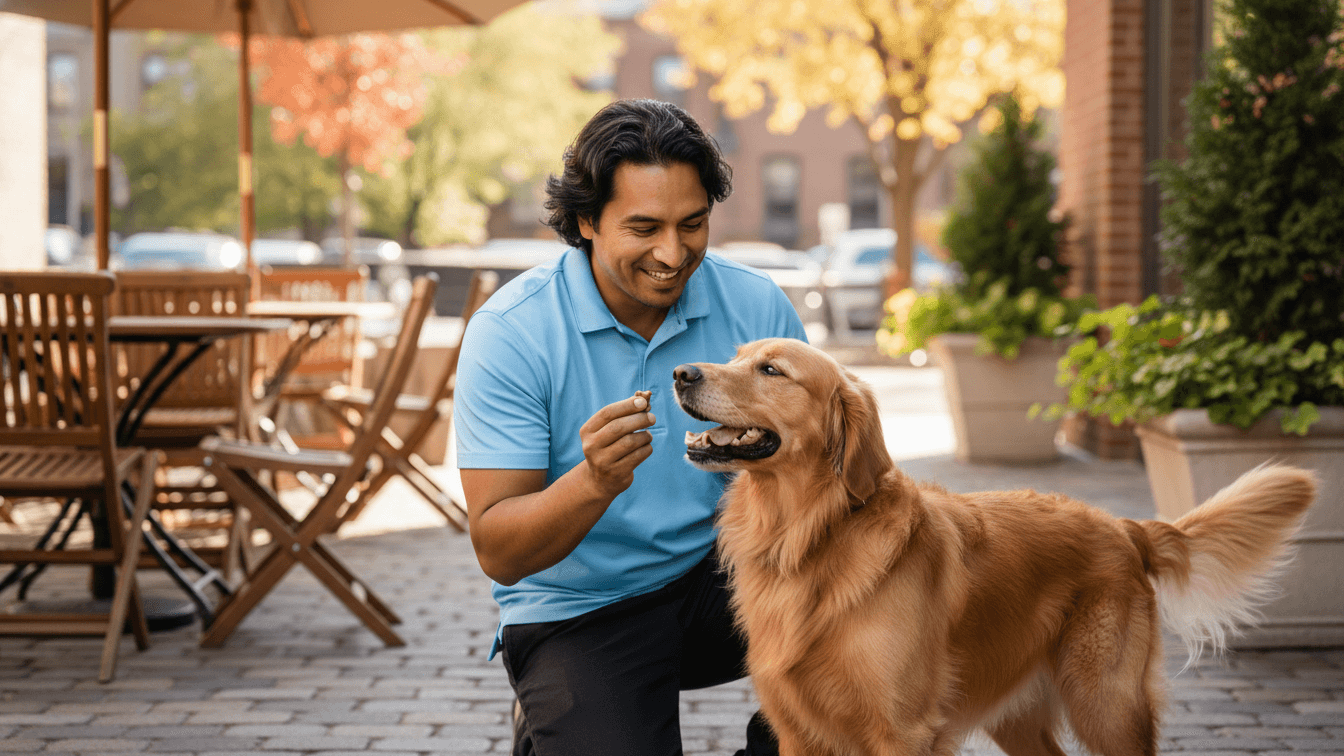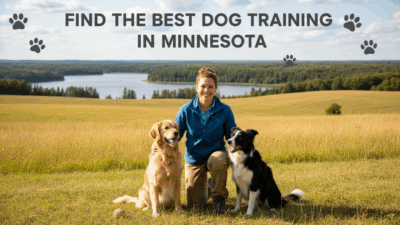Your Complete Guide to Choosing a Dog Trainer in Minnesota
Finding the right professional dog trainer in Minnesota means understanding what makes this state unique for dog owners. From Minneapolis dog parks that see sub-zero winter days to the diverse landscapes stretching from the Twin Cities metro to the Iron Range, your dog needs to handle everything from crowded urban sidewalks to rural trails where wildlife encounters are common.
Minnesota’s strong community of dog owners takes training seriously, whether you’re in St. Paul preparing for city life or in Duluth getting ready for lakeside adventures. A good trainer will help you navigate state-specific rules while building the skills your dog needs for Minnesota’s distinct lifestyle.
How to Choose the Right Trainer
Start by looking for someone who uses positive reinforcement training and understands Minnesota’s regulations around dogs in public spaces. Your trainer should help you prepare for real-world situations like navigating crowded farmers markets, staying calm during holiday festivals, or maintaining focus when encountering deer or other wildlife on hiking trails.
Credentials matter when comparing trainers. Look for dog trainer certifications like CPDT-KA, KPA-CTP, or IAABC-CDBC for behavior concerns. If you’re dealing with serious aggression or fear issues, ask about CBCC-KA certification or other advanced behavior qualifications.
In-home dog training works especially well for addressing household behaviors like door manners, jumping on guests, or barking at neighbors. Group classes make sense once your dog can focus around distractions, preparing them for busy public spaces throughout the state.
Consider whether your trainer offers a free consultation or free evaluation. This lets you assess their methods, ask questions, and make sure their approach fits your goals before committing to a full training program.
Common Dog Training Methods Explained

Reward-based methods create lasting results while keeping your relationship with your dog positive and trusting. These approaches also help you stay compliant with Minnesota’s animal control laws, which emphasize keeping dogs under control without relying on fear or force.
Basic obedience covers the foundation skills every Minnesota dog needs: sit, down, stay, recall, and leash training. These behaviors let your dog handle everything from veterinary visits to walks through busy neighborhoods without pulling or jumping on strangers.
Puppy training focuses on socialization, potty training, bite inhibition, crate comfort, and early leash skills. Starting young prevents problem behaviors from developing and helps your puppy adjust to Minnesota’s distinct environments, from urban settings to rural properties.
Behavior modification addresses serious issues like reactivity, separation anxiety, resource guarding, or fear-based aggression. These concerns require careful desensitization and counterconditioning, often in partnership with your veterinarian when anxiety or medical factors play a role.
Private lessons and in-home sessions let you customize everything around your daily routine and specific environment. Day training can accelerate progress when you need faster results or have limited time for training sessions.
Dog training classes and group classes help your dog practice good manners around other dogs and people. The best classes keep dogs safely spaced, screen participants carefully, and teach calm behavior instead of encouraging overexcitement.
Specialized training like service dog training or therapy dog training requires structured public-access skills and step-by-step preparation. Make sure your trainer has specific experience in these areas rather than just general obedience work.
Board and train programs can work for some situations, but ask detailed questions about methods, daily schedules, and how the trainer will help you maintain skills after your dog comes home. Not all board and train facilities use humane methods, so verify their approach carefully.
Avoid trainers who rely on fear, pain, or intimidation. These outdated methods damage trust and can create new behavior problems while making you look bad to your Minnesota neighbors who value humane animal treatment.
Average Cost of Dog Training in Minnesota (Updated for 2025)
Prices across Minnesota vary based on the trainer’s credentials, session length, and whether services happen in-home or at a training facility. Metro areas like Minneapolis and St. Paul typically run higher than rural regions, but expertise matters more than location.
| Service Type | Average Cost (Minnesota) |
|---|---|
| Puppy classes (4-6 weeks) | $140-$280 total |
| Group obedience classes (4-6 weeks) | $150-$300 total |
| Private lessons (60-90 min) | $100-$180 per session |
| In-home training packages (4-6 visits) | $400-$850 total |
| Day training (trainer works your dog) | $400-$900 per week |
| Behavior consult (reactivity/anxiety initial) | $140-$240 |
| Board and train (2-4 weeks) | $1,800-$4,200 total |
Trainers may charge travel fees for areas outside their usual service radius. Behavior modification work for aggression or severe anxiety typically costs more than basic obedience training.
Make sure you understand what’s included in the price, how progress gets tracked, and what happens if you need to reschedule training sessions.
Questions to Ask a Potential Dog Trainer
- What training methods do you use, and how do you ensure sessions stay positive and stress-free?
- What certifications do you hold, like CPDT-KSA or KPA-CTP? How do you stay current with new training science?
- How will you customize the training plan for my dog’s specific needs and Minnesota lifestyle?
- Do you offer private lessons, group classes, or day training, and which format fits my situation best?
- How will we measure progress and know when to add more difficult distractions?
- What are the total costs including any travel fees, and what’s your cancellation policy?
- Do you carry liability insurance, and can you provide proof of coverage?
- For behavior problems, will you coordinate with my veterinarian if needed?
- What should I practice between our sessions to help my dog keep improving?
- Do you offer a free consultation so we can meet before committing to a full program?
Local Minnesota Rules and Considerations
Minnesota enforces animal control regulations at both state and local levels. Understanding these rules helps you train your dog to be a well-behaved companion while avoiding legal trouble.
State law requires dogs to be under reasonable control at all times, though specific leash requirements vary by city and county. Most urban areas require leashes in public spaces except inside designated off-leash dog parks. Check your local ordinances for exact requirements.
Minnesota Statutes Section 347.09 through 347.56 covers dangerous dog declarations and requirements. If your dog has aggression issues, work with a qualified professional before problems escalate to legal consequences.
All dogs in Minnesota must be vaccinated against rabies according to Minnesota Statutes Section 347.09. Your veterinarian will provide a rabies certificate and tag that must be kept current. The Minnesota Board of Animal Health oversees these requirements statewide.
Excessive barking falls under local nuisance ordinances in most Minnesota cities. Training your dog to reduce alert barking and separation anxiety helps maintain good relationships with neighbors and avoids potential complaints.
Minnesota does not require state licensing for dog trainers. However, professional dog trainer credentials like those mentioned earlier help you identify qualified experts. Trainers who board dogs may need to comply with commercial kennel licensing requirements through the Minnesota Board of Animal Health.
Local Minnesota Resources for Dog Owners
These locations give you excellent opportunities to practice training skills, provide enrichment, and socialize your dog in controlled environments. Always follow posted rules and respect other park users.
- Lebanon Hills Regional Park Off-Leash Dog Area in Eagan offers fenced space for off-leash practice and recall training in a supervised setting.
- Minnehaha Off-Leash Dog Park in Minneapolis provides separate areas for large and small dogs, perfect for practicing polite greetings and calm behavior around other dogs.
- Bryant Lake Regional Park Off-Leash Dog Area in Eden Prairie features wooded trails and open space where dogs can practice recalls in a more natural setting while staying within the designated off-leash boundaries.
Many Minnesota state parks and trails welcome leashed dogs, giving you excellent settings to work on leash training, impulse control around wildlife, and focus despite natural distractions. Check individual park regulations before visiting.

FAQs
How much does in-home dog training cost?
Most Minnesota trainers charge $100-$180 per in-home session, with package discounts available when you book multiple visits. Behavior modification for reactivity or aggression typically starts at the higher end of that range.
Is in-home dog training worth it?
Absolutely, because you’re addressing problems exactly where they happen. Your trainer can work on door manners, jumping on guests, barking at passersby, and household management right in your home, then step outside to practice leash skills on your actual sidewalks and neighborhood routes.
Can you pay someone to house train your dog?
Yes, many trainers offer puppy programs that include potty training schedules, crate training, and management strategies. Day training can speed up the process while teaching you how to maintain consistency after the trainer leaves.
What is the 3-3-3 rule for dog training?
This timeline helps set realistic expectations for rescue dogs or newly adopted pets: roughly 3 days to decompress from the transition, 3 weeks to start learning your routines, and 3 months to feel fully settled. Effective training programs work with this natural adjustment period rather than rushing progress.
How long will it take to reach my training goals?
Most puppies and friendly adult dogs show noticeable progress within 4-8 weeks of consistent work. Fear, reactivity, and aggression typically require several months of careful behavior modification with gradual increases in difficulty and distraction levels.
What should I bring to group classes?
Pack a flat collar or harness, a 6-foot leash, high-value treats your dog loves, water, and current vaccination records if your trainer requires them. Leave retractable leashes at home since they create safety concerns in group settings.
What’s the leash law in Minnesota?
Minnesota state law requires dogs to be under reasonable control, but specific leash requirements vary by city and county. Most urban areas require leashes in all public spaces except designated off-leash dog parks. Check your local ordinances for exact rules.
Do I need a dog license in Minnesota?
Dog licensing requirements vary by city and county across Minnesota. Many municipalities require annual licenses, while some rural areas do not. Contact your local city hall or county office to learn what applies in your area.
What shots does my dog need in Minnesota?
Minnesota requires rabies vaccination for all dogs according to state law. Your veterinarian will also likely recommend distemper-parvo combination vaccines and bordetella based on your dog’s lifestyle and exposure risks. Keep vaccination records current and accessible.
Are dog trainers required to be licensed in Minnesota?
No, Minnesota does not require state licensing for dog trainers. Trainers operate under general business regulations, but those offering boarding services may need commercial kennel licenses through the Minnesota Board of Animal Health. Look for professional certifications to verify a trainer’s qualifications.
Where can I practice off-leash recall?
Use designated off-leash dog parks where your dog can be safely contained while you work on recall skills. Fenced dog parks throughout Minnesota provide legal spaces for this practice. Never practice off-leash recalls in areas where leashes are required by law.
Which dog parks allow training around Minnesota?
Most Minnesota dog parks welcome training as long as you’re not operating a commercial business without proper permits. Lebanon Hills Regional Park, Minnehaha Off-Leash Dog Park, and Bryant Lake Regional Park all work well for practicing obedience training and socialization during less crowded hours.
What beaches or trails allow dogs for training?
Many Minnesota state parks welcome leashed dogs on trails, including Gooseberry Falls State Park, Interstate State Park, and Wild River State Park. These locations offer excellent opportunities to practice leash training and impulse control around wildlife and other hikers. Always verify current regulations before visiting.
Can my dog be off-leash on hiking trails?
Most Minnesota state parks and public trails require dogs to be leashed at all times outside of designated off-leash areas. Even if your dog has excellent recall, keeping them leashed protects wildlife, respects other trail users, and keeps you compliant with state regulations.
What if my dog is aggressive toward other dogs?
Work with a certified dog trainer who specializes in behavior modification and reactivity. They can create a systematic desensitization plan to help your dog feel safer around other dogs while keeping everyone protected during training sessions. Don’t attempt group classes until your dog is ready.
The right combination of expert dog trainers, humane methods, and consistent practice throughout Minnesota’s diverse environments will help your dog become a confident, well-behaved companion. Whether you’re in Minneapolis, St. Paul, Rochester, Duluth, or anywhere across the state, quality dog training services make all the difference in creating a strong relationship with your top dog.
